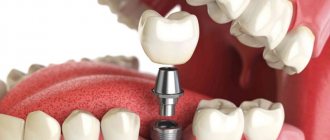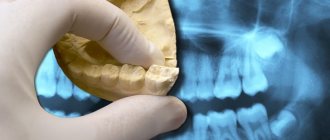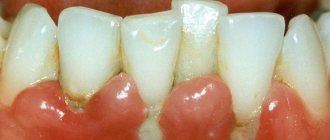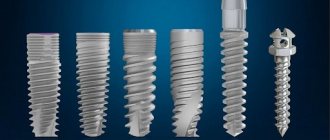Chief editor of the site:
Snitkovsky Arkady Alexandrovich
Chief physician of the professorial dentistry “22 Century”, dentist, orthopedic dentist
Author of the article:
Scientific team of dentistry “22 Century”
Dentists, candidates and doctors of medical sciences, professors
Consultation on dental prosthetics
Prosthetics are indicated for the loss of one, several, or all teeth. Modern dental clinics offer a wide range of designs that differ not only in indications, but also in price, quality and appearance. Of course, every patient expects to receive the most aesthetic, high-quality and durable work. It is for the purpose of the highest quality dental prosthetics that each patient should sign up for a free consultation, where the doctor, after performing an initial examination, will give comprehensive information about all the ranges of work to be done and answer all questions. In addition, consultation with related specialists, such as a periodontist, surgeon, therapist, orthodontist, allows you to draw up a treatment plan as accurately as possible, taking into account all the features of each clinical case, determine the preparation of the oral cavity for prosthetics and choose the most suitable design.
Consultations with related specialists before dental prosthetics
After an initial examination and drawing up a preliminary treatment plan, the orthopedic dentist in most cases will invite doctors from other specialized areas to conduct an expanded diagnosis. Each of them, examining the patient, taking into account the characteristics of their specialty, indicates the possible presence of hidden problems or recommends the most optimal solution to hidden ones, which allows a comprehensive assessment of the situation. This makes it possible to prevent the development of complications in the future and, thereby, extend the service life of the prosthesis. Also, this approach speaks of high professionalism and attentive attitude to each specific case.
Consultation with an otopedist-dentist
This is the main specialist in the process of manufacturing and installing prosthetic structures . During the consultation, the doctor determines the need and type of prosthesis, the material for its manufacture, having carried out an initial examination and interview, taking an anamnesis, etc. He also recommends examinations by dentists of other specialties, if necessary. Sometimes the final decision is made by a council of doctors. The price of the selected work and the timing of its completion are discussed with the patient. The doctor answers all the patient’s questions and gives recommendations on choosing the most suitable design.
In what cases should I contact
The reasons why you need to see an orthopedic dentist are varied. If severe tooth decay occurs, this is a serious reason to visit a doctor, because in addition to aesthetics, the functionality of the teeth may also suffer. Each tooth plays an important role in human life, so its destruction affects the functioning of the entire organism.
An orthopedic dentist is also necessary to ensure timely protection of the tooth from destruction. It is worth considering that not every type of prosthesis can completely restore a tooth. Many dentures are responsible for restoring only certain parts of the teeth. If a tooth has become fragile and susceptible to defects, then timely consultation with a doctor will prevent its further destruction.
Correction of small defects in the crown of the tooth also requires the help of a specialist.
Unfortunately, not all people can boast of perfect teeth. In some cases, the use of veneers will be an excellent solution to the problem. High-quality plates will help hide defects in the dentition.
Consultation with a periodontist
A periodontist is a specialist who treats diseases of the gums and oral mucosa. During the consultation before dental prosthetics, the doctor determines hygienic and periodontal indices, which indicate the cleanliness of the oral cavity, and determine the presence of periodontal inflammatory processes. Also carries out professional hygienic cleaning to remove soft and hard sub- and supragingival plaque. In addition, complex treatment of periodontitis may be prescribed if this problem exists. This will extend the life of both the prosthesis and its natural supports.
What determines the quality of prosthetics?
Advertisements that litter the Internet tend to focus on materials. For example:
- “Metal ceramics for 3,900 rubles!”
- “Zirconium crowns for 5,000 rubles, subsequent tooth extraction is free!”
- “Removable denture for 10 thousand”,
and so on.
Meanwhile, the role of materials in the quality of manufactured prostheses is greatly exaggerated. Ordinary metal-ceramic crowns can be made more aesthetically pleasing than ceramic ones, and they will be very different from each other, because it depends on who made them and how.
Let's show a simple example:
Therefore, we would highlight the “quality triad” - three components that determine how functional, aesthetic and durable your new teeth will be:
Total, by points:
- original components are necessary primarily for implant prosthetics. Now, for almost every implantation system, Chinese counterfeits are produced, and with the increase in the accuracy of digital milling machines, doctors and laboratories have the opportunity to produce the same abutments almost on the knee.
However, no one is yet able to replicate the original dimensions and alloys (the latter is important to avoid galvanism and corrosion). Therefore, all manufacturers of implantation systems will void the warranty if, during the examination of the doctor’s joint, any left-handed screw or abutment is found. Our dental center CLINIC IN works directly with the world's largest manufacturer of implantation systems, Dentsply Sirona Implants, we do not need to use counterfeit products to save money. Therefore, all our work, all original components we use, are covered by the manufacturer’s warranty. You can read more about this here>>. - highly qualified dental technician and well-equipped dental laboratory. Indeed, it is unlikely that we can offer you digital technologies if our laboratory does not have special equipment and trained personnel.
In addition, each dental crown, each prosthesis is, in fact, a piece of art - and the extent to which the dental technician masters this art will depend on the aesthetics of the final product. Making highly aesthetic dentures is a unique fusion of art, good taste and engineering. And, unfortunately, few dental technicians can offer a job worthy of you. And those who are, as a rule, are in great demand, so they ask for a lot of money for their services. Through a lengthy search and a very strict selection, our orthopedic doctors, David, Kirill and Ivan, selected four dental laboratories from thirty candidates, the quality of which would suit us and our patients. Yes, such work is not cheap, but you will never guess the artificial teeth in the smiles of our friends. We will definitely tell you about our partner laboratories in one of the future articles, since the manufacture of dentures is a very interesting and extensive topic. - a medical specialist is, in a way, the chief architect of any dental rehabilitation. His task includes not only preparing teeth and implants for fixing restorations and prostheses, but also managing the entire process of patient treatment - it is the orthopedic dentist who determines the placement scheme of implants, together with the dentist-therapist makes a decision on the preservation/removal of teeth, and gives recommendations on the form and the color of future crowns, and in some cases models them independently. Their service life largely depends on the orthopedic dentist’s understanding of the rules of prosthetics on implants, so when planning implantation, he is always somewhere nearby.
Our dental center employs highly qualified dental specialists who have undergone rigorous selection and testing with fire, water and copper pipes.
They can handle prosthetics of any complexity and any option, no matter what you choose. But, most importantly, they understand and accept your wishes, take into account your characteristics and needs, they restore YOUR teeth, not their own, so all their experience, all their competence and all their arsenal of means are aimed at achieving only one goal - you must like the result, first everything, to you. Chief's comment: The ability to hear and understand your patient is perhaps the main quality for a dentist involved in the aesthetic and functional rehabilitation of a smile. In the end, if function can be calculated and adjusted, then aesthetics is a subjective and individual concept for each of us. Just as there are no specific standards of beauty, there is no one generally accepted idea about the aesthetics of a smile. It’s the task of our doctors to figure this out and take into account what you need. It is their direct responsibility to realize what you want without loss of functionality, durability, reliability and comfort. That is why such doctors work for us.
Consultation with an orthodontist
An orthodontist deals with the correction of the bite as a whole and the incorrect position of individual teeth. Sometimes the intervention of this specialist is necessary to create space for the installation of a future structure, because orthodontic appliances are the most gentle method, although they take some time. They do not require preparation or root canal treatment. And the system itself can be removed with special tools without harming the enamel. The fact is that their need arises when there is a long-term absence of replacement of formed defects. In this case, the adjacent or antagonist teeth begin to move to close this gap. As a result, there is not enough space for the structure and the question is how to create the necessary space. The solution may be an orthodontic device.
Consultation with a dental surgeon
Dental implantation
The specialization of the dental surgeon speaks for itself. Consultation with this specialist is essential before prosthetics. After an initial examination, the doctor determines the teeth to be removed , the presence of exostoses or mucous strands in the case of complete edentia and the manufacture of a removable structure. The surgeon will also explain issues of implantation , bone grafting and sinus lifting. Sometimes it is implantation that allows a complete removable denture to be firmly and reliably fixed in the oral cavity. The patient receives answers to all questions regarding the course of the operation, pain relief, the postoperative period, and the cost of treatment.
What types of dentures are there?
Modern dentures are divided into two types: removable and non-removable, that is, permanent.
Removable dentures are represented in turn by several types:
- clasp structures for partial dentures: fastened with metal hooks or invisible clasps, have a solid metal base,
- dentures made of hard plastics: the most inexpensive type of prosthetics. Such designs are usually called plate-type - besides the low price, they have practically no advantages. But the disadvantages can be identified as follows: poor fixation, frequent rubbing of the mucous membrane, massiveness, which leads to acute discomfort and increased gag reflex,
- dentures made of soft plastics (nylon, new generation acrylic, Acree Free, Quadrotti and polyurethane): they are all very elastic, so they fit very tightly and softly to the gums and do not cause painful rubbing of the gums. They are practically not felt in the mouth. Suitable for both partial and complete prosthetics of the entire dentition.
Fixed structures include crowns and dental bridges, for the manufacture of which crowns are also used. Such designs are created from several materials: solid ceramics (for prosthetics of front teeth), a combination of metal and ceramics (mostly for lateral teeth, since such crowns are strong, but metal can be visible in the light), as well as zirconium (universal, the most durable and the most aesthetic option).
Single crowns, as well as bridges, require support. They can be attached to your own tooth (but if the top is destroyed, the root will need to be strengthened with a pin or stump insert), or on an implant - an artificial root that is installed in the bone tissue.
Important! Dental implantation occupies a separate niche in prosthetics. An almost unlimited number of implants can be installed on one row of teeth, depending on the defect. For example, for a full jaw you will need from 4 pieces. You can attach absolutely any prosthesis on top - a single crown, a dental bridge or a removable structure.
Consultation with a dentist
An examination and recommendations by a dentist-therapist before dental prosthetics allows us to identify carious cavities, complications caused by the carious process such as pulpitis and periodontitis, as well as determine the most effective treatment for them. The therapist also prepares supports for bridge structures or crowns, if necessary. This refers to the treatment and filling of root canals.
Consultations on dental prosthetics and implantation help each patient with many questions that arise. Also, such an integrated approach allows you to plan the upcoming treatment as carefully as possible, which ensures a long-term, high-quality result.
Date of publication: September 20, 2020 Last update: September 22, 2022 © 2020 Professorial Dentistry “22 Century”. All rights reserved.








